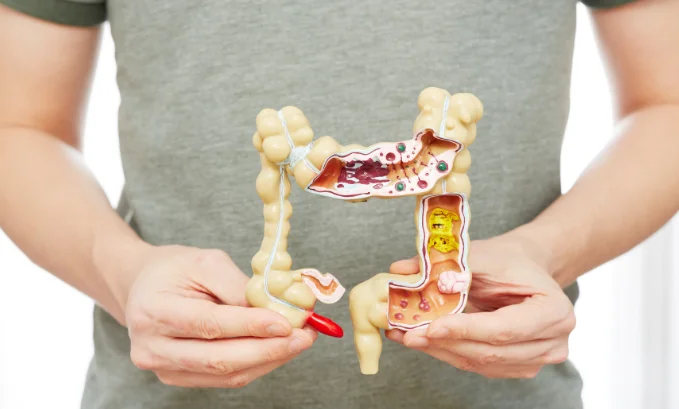
The following blog post is for entertainment and informational purposes only. It is not intended to provide medical advice or diagnosis. Please consult your doctor before making any health-related decisions.
A major compound for managing type 2 diabetes and promoting weight loss is presented by Semaglutide, an agonist of the GLP-1 receptor. This medicine emulates the performance of the natural hormone GLP-1. So, it regulates blood glucose levels and reduces appetite. Despite its exemplary performance in treating patients with these conditions, like any other drug available on the market today, it comes along with some possible unwanted reactions. Constipation with Semaglutide appears as one of its most prevalent side reactions reported among users.
Let’s examine the correlation between Semaglutide and constipation and uncover why this adverse event arises. Let’s know how the Semaglutide constipation event can be efficiently managed.

Active Mechanism
Semaglutide impacts different digestion and metabolic functions. This substance works to regulate blood glucose levels. It triggers insulin generation in response to heightened sugar amounts. It also inhibits glucagon release. Additionally, this medicine intervenes with the stomach’s process of moving food into the small intestine. This results in sustained fullness. This effect presents a key contributing factor to its efficacy in weight loss management.
However, the postponement of gastric emptying can result in a supplementary outcome. the pace of defecation and possible constipation from Semaglutide can occur.
Seek an Explanation: Why Does Semaglutide Cause Constipation Appearance?
Semaglutide is widely recognized for its advantageous impact on controlling blood sugar levels and regulating appetite. However, some people experience constipation from Semaglutide as an adverse reaction. Let’s examine the mechanics of this symptom reasons. This can help in devising efficient strategies to cope with it.
Delayed Emptying of Gastric
Can Semaglutide cause constipation occurrence? Let’s explore its primary performance.
Semaglutide constipation event is primarily attributed to its impact on the speed of emptying of the gastric. Decelerating the movement of food from the stomach into the small intestine helps to regulate glucose levels in the blood and advance satiety. However, it also entails a general sluggishness in digestion.
This medicine prolongs the duration of food in the stomach. This causes a deceleration in the general digestion process. This sluggish flow influences how swiftly nutrients and waste are conveyed through one’s intestines, thus heightening vulnerability to constipation and hindering bowel movements.

Reduced Gastric Motility
The impact of the medicine on gastric motility – the movement occurring in the digestive tract – can directly influence the efficiency with which waste is processed and intestines are able to move.
Reduced motility of the intestines can lead to slower waste movement in the digestive tract. As a result, stool becomes harder and bowel movements become less frequent. So, this leads to constipation from Semaglutide.
Fluid Intake Modifications
Changes in fluid intake can have an impact on constipation. Eating and drinking less may be a result of Semaglutide’s ability to decrease appetite, potentially affecting this condition.
Reduced appetite or feeling full may lead to limited food and fluid intake, including water. However, considering that maintaining soft stools requires sufficient hydration, a decrease in liquids can worsen constipation as it makes the fecal matter harder and more challenging to expel.
Impact on Digestive Hormones
The action of the organic hormone GLP-1 on digestion is imitated by Semaglutide. This showcases different reactions.
This medicine indirectly affects bowel movements. It influences digestive hormones, slows digestion, and impacts the frequency and ease of passage. This is because GLP-1 aids in regulating both insulin secretion and digestion, with the compound being one such agent that can impact this process to affect how easily stool passes through.
Dietary and Lifestyle Changes
Changes in diet and lifestyle may also contribute to constipation from Semaglutide usage.
You can end up eating fewer calories and reducing your fiber intake. A decrease in dietary fiber can cause constipation. The stool lacks bulk and makes passing bowel movements more challenging.
Changes in appetite results in decreased food consumption. This can have an impact on the consistency of digestion and lead to Semaglutide constipation events.
Possible Digestive Irritation
The medicine can cause digestive irritation in some users. They can encounter discomfort and alterations in constipation from Semaglutide.
Does Semaglutide cause constipation adverse reactions? Let’s sum up the data. The main reason for this event is that it interferes with gastric emptying and gut motility. This causes the digestive process to slow down. So, this action can lead to drier stools and less frequent bowel movements because fluid intake is possibly decreased. Moreover, dietary adjustments can exacerbate this condition further.
Educating yourself about the Semaglutide constipation appearance can assist you in taking anticipatory measures to uphold digestive wellness while still reaping the therapeutic advantages of this medicine.
How Common is Semaglutide Constipation Event?

The drug’s use is often linked to digestive adverse events. Constipation from Semaglutide occurs most frequently. Nausea, vomiting, and diarrhea can also appear. Clinical tests show the experience of mild constipation in a significant percentage of users at the early stages of treatment. This unwanted event is well managed. However, it can cause discomfort and disrupt daily life. Fortunately, it usually lessens because the organism adapts to medicine with time.
How to Relieve Constipation from Semaglutide
To mitigate constipation from Semaglutide, numerous methods exist to alleviate this adverse reaction and aid in regular bowel movements.

Increase Fiber Intake
Consuming fruits, vegetables, whole grains, and legumes can help soften stools and promote regular bowel movements. Fiber adds volume to the stool and helps easier passage.
Stay Hydrate
You are recommended to consume an ample amount of water. Sufficient intake of fluids helps maintain loose stools and advances regular digestion. You need to drink at least 8 cups of water daily. However, people with active lives or who reside in warm temperatures need increased fluid consumption.
Exercise Regularly
Engaging in physical performance encourages contractions of the intestines. It fosters healthy bowel movements. Consistent exercise routines like walking have proven to decrease the probability of constipation from Semaglutide.
Avoid Processed Food
Semaglutide constipation events can be aggravated by processed foods. You are advised to restrict the intake of sugary treats, fast food items, and fried snacks because they can further impede digestion.
Consider Over-the-Counter Remedie
Making changes to your lifestyle cannot alleviate the issue. So, you can contemplate utilizing stool softeners or fiber supplements. These can furnish momentary Semaglutide constipation relief. However, you need to exercise caution and avoid depending on Semaglutide constipation treatment for an extended period of time without seeking guidance from a medical service professional.
Monitor Food Portion
Semaglutide decreases your hunger. So, you can end up consuming smaller amounts of food. However, even small meals need to be well-rounded and include sufficient fiber for smooth digestion.
When to Seek Medical Advice

Although the Semaglutide constipation event is typically not a significant adverse reaction, there are instances when it may require medical intervention. If you encounter intense discomfort, hemorrhaging, or find challenges in bowel movement for multiple days, promptly inform your medical professional. They can examine if these indications stem from drug consumption or another fundamental problem to determine the best course of action.
The users often experience constipation from Semaglutide, as the medication affects gastric emptying and digestion. However, individuals can manage this side reaction through dietary changes, staying hydrated, and regular exercise. If severe or persistent symptoms occur despite these efforts, consulting a healthcare provider is recommended to find ways of reducing discomfort while continuing Semaglutide therapy.
By comprehending “What can I take for constipation while on Semaglutide” and how to tackle this event and modifying your behavior accordingly, you can guarantee that the digestive side reactions do not impede you from gaining complete advantages of Semaglutide.







